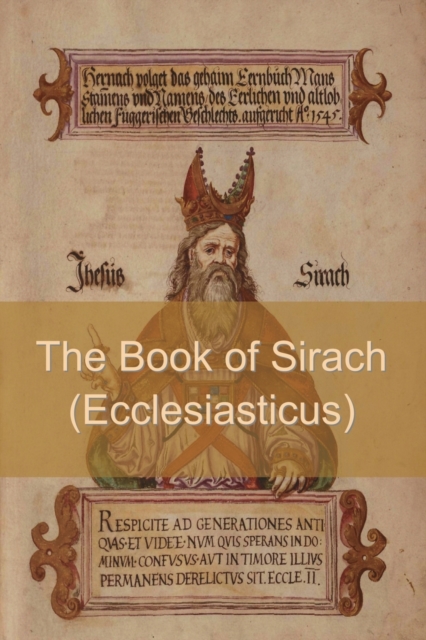The Book of Sirach (or Ecclesiasticus)

The Book of Sirach (or Ecclesiasticus)
In Egypt, it was translated into Greek by the author's unnamed grandson, who added a prologue. This prologue is generally considered the earliest witness to a canon of the books of the prophets, and thus the date of the text is the subject of intense scrutiny. The book itself is the largest wisdom book from antiquity to have survived.
Although excluded from the Jewish canon, Sirach was read and quoted as authoritative from the beginning of the rabbinic period. There are numerous citations to Sirach in the Talmud and works of rabbinic literature (as "ספר בן סירא", e.g., Hagigah 13a, Niddah 16b; Ber. 11b). Some of those (Sanhedrin 100b) record an unresolved debate between R'Joseph and Abaye as to whether it is forbidden to read the book of Sirach, wherein Abaye repeatedly draws parallels between statements in Sirach cited by R'Joseph as objectionable and similar statements appearing in canonical books.
Sirach may have been used as a basis for two important parts of the Jewish liturgy. In the Mahzor (High Holiday prayer book), a medieval Jewish poet may have used Sirach as the basis for a poem, Mar'e Kohen, in the Yom Kippur musaf ("additional") service for the High Holidays. Yosef Tabori questioned whether this passage in Sirach is referring at all to Yom Kippur, and thus argued it cannot form the basis of this poem. Some early 20th-century scholars also argued that the vocabulary and framework used by Sirach formed the basis of the most important of all Jewish prayers, the Amidah, but that conclusion is disputed as well.
Current scholarship takes a more conservative approach. On one hand, scholars find that "Ben Sira links Torah and wisdom with prayer in a manner that calls to mind the later views of the Rabbis", and that the Jewish liturgy echoes Sirach in the "use of hymns of praise, supplicatory prayers and benedictions, as well as the occurrence of [Biblical] words and phrases [that] take on special forms and meanings." However, they stop short of concluding a direct relationship existed; rather, what "seems likely is that the Rabbis ultimately borrowed extensively from the kinds of circles which produced Be
PRP: 127.13 Lei
Acesta este Prețul Recomandat de Producător. Prețul de vânzare al produsului este afișat mai jos.
114.42Lei
114.42Lei
127.13 LeiLivrare in 2-4 saptamani
Descrierea produsului
In Egypt, it was translated into Greek by the author's unnamed grandson, who added a prologue. This prologue is generally considered the earliest witness to a canon of the books of the prophets, and thus the date of the text is the subject of intense scrutiny. The book itself is the largest wisdom book from antiquity to have survived.
Although excluded from the Jewish canon, Sirach was read and quoted as authoritative from the beginning of the rabbinic period. There are numerous citations to Sirach in the Talmud and works of rabbinic literature (as "ספר בן סירא", e.g., Hagigah 13a, Niddah 16b; Ber. 11b). Some of those (Sanhedrin 100b) record an unresolved debate between R'Joseph and Abaye as to whether it is forbidden to read the book of Sirach, wherein Abaye repeatedly draws parallels between statements in Sirach cited by R'Joseph as objectionable and similar statements appearing in canonical books.
Sirach may have been used as a basis for two important parts of the Jewish liturgy. In the Mahzor (High Holiday prayer book), a medieval Jewish poet may have used Sirach as the basis for a poem, Mar'e Kohen, in the Yom Kippur musaf ("additional") service for the High Holidays. Yosef Tabori questioned whether this passage in Sirach is referring at all to Yom Kippur, and thus argued it cannot form the basis of this poem. Some early 20th-century scholars also argued that the vocabulary and framework used by Sirach formed the basis of the most important of all Jewish prayers, the Amidah, but that conclusion is disputed as well.
Current scholarship takes a more conservative approach. On one hand, scholars find that "Ben Sira links Torah and wisdom with prayer in a manner that calls to mind the later views of the Rabbis", and that the Jewish liturgy echoes Sirach in the "use of hymns of praise, supplicatory prayers and benedictions, as well as the occurrence of [Biblical] words and phrases [that] take on special forms and meanings." However, they stop short of concluding a direct relationship existed; rather, what "seems likely is that the Rabbis ultimately borrowed extensively from the kinds of circles which produced Be
Detaliile produsului










